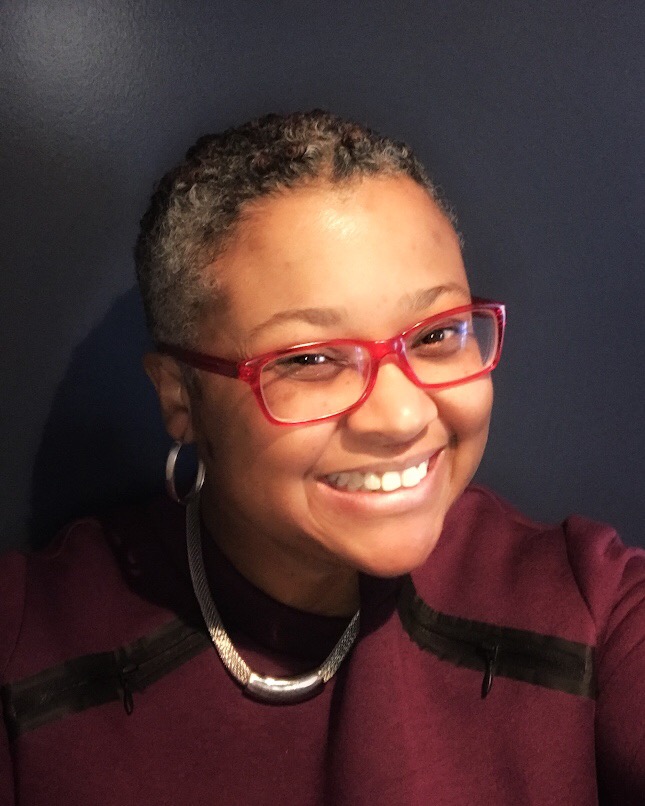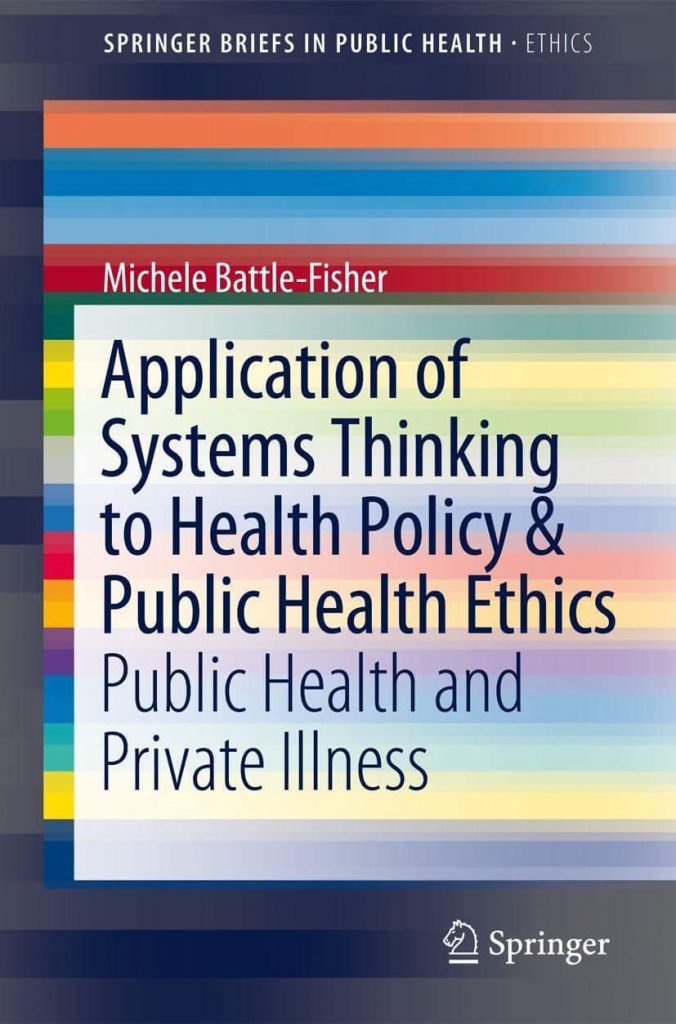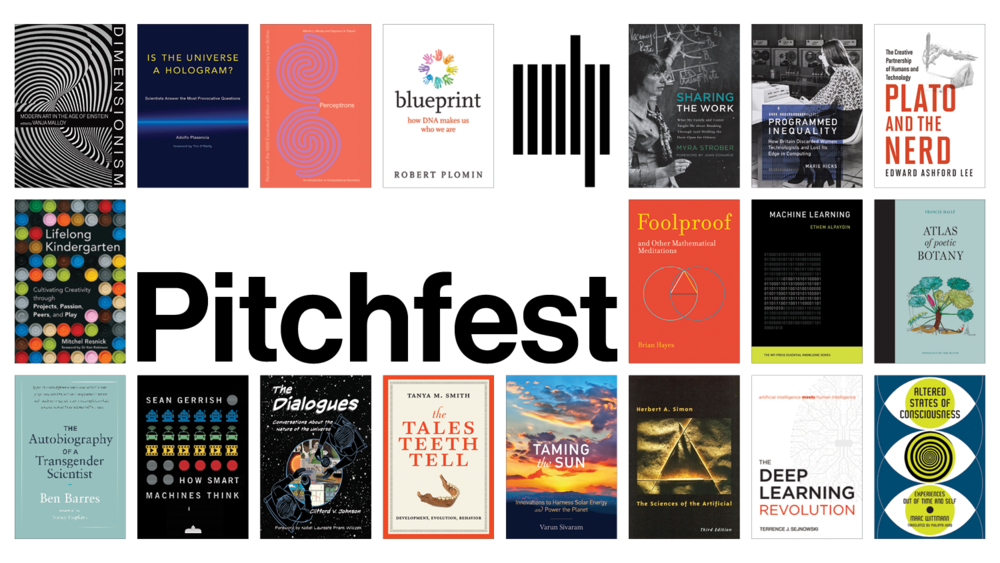
Welcome back to our occasional “Better Know a Ronin Scholar” series, where we learn more about the research and other activities of our Research Scholars. Earlier this month, I talked to Research Scholar Michele Battle-Fisher (pronoun: she/her). Michele’s interdisciplinary research spans public health, complex systems and bioethics. Michele wears many hats. In addition to being a scholar at the Ronin Institute, she is an Assistant Adjunct Professor at Wright State University in Ohio, a member of the Bertalanffy Center for the Study of System Science, and the author of Applications of Systems Thinking to Health Policy and Public Health Ethics. She was a TEDxDartmouth speaker and a participant in the MIT Press Pitchfest.
Welcome Michele! 2020 has been a bit of a doozy of a year thus far. How are you holding up?
Thanks for having me today. This is kind of cataclysmic for me. Between Black Lives Matter and COVID, I’m kind of in overload. But I think it also brings to the point why I do the work that I do in public health: looking at the ethics and complexity of health care systems. So right now, the ethics are: “why do we have a horrible public health system when it’s obvious we were in need of one? And when we were in need of one, why were we not prepared?” We have an ethical issue of where we’re allocating our money–whether it needs to be on the clinical end or it needs to be on the preventative end. In addition, public health does well in expressing the overarching social determinants that make staying healthy individually and as a population overwhelmingly difficult. Yet, public health continues that fight. As a true Ronin, I use a new angle to add to the social complexity afoot.
Why do we have a horrible public health system when it’s obvious we were in need of one? And when we were in need of one, why were we not prepared?
COVID-19 is showing that we act in–at least in the United States–very much from a reactionary position. We deal with our problems when they happen. With this pandemic, I hope we will have a larger discussion of the pre-existing health disparities of people of color, LGBTQ, plus disability. The list could go on and on. It illuminates the holes we have in society and how some of us are falling into those holes. And they’re not throwing a rope in order for us to get us out of that well. So I really dedicate myself to that work and I hope that it’s doing some good.
You published your book, the Applications of Systems Thinking to Health Policy and Public Health Ethics by Springer back in 2016. It seems to have even more relevance now that public health is front and center. Is there more interest in that scholarship?

In 2012, I took part in a research program with the National Institutes of Health, it was called ISSH (Institute on Systems Science and Health), that brought together 45 competitively selected researchers in the areas of agent based modelling, social networks and system dynamics. I reaffirmed my love for systems there.
I started writing the book back in 2015. And it started out from a blog that I had run for about two years previously – called Orgcomplexity. I started trying to connect this whole idea of systems thinking, which came from general systems theory and systems biology – and also the world of physics with chaos and emergence and attractors. I worked very publicly through those ideas, which to some may be foolish because I was doing something that wasn’t within the norm. I was able to actually work out ideas, have people react to my ideas and work on this framework.
Is a systems approach always the best approach to public health?
Yes and no: it may surprise some who say: “well, isn’t everything complex?” And do we always look at it from that complex lens? We don’t always do that because it also depends on the question you’re asking. Some questions are best answered from a very linear reductionist standpoint: biostatistics measures for example. Those methods are appropriate for those questions. I am just asking that if the question is divergent in nature that we do not jump to using convergent solutions. We are all susceptible to mental models which is the first step for making sense of our world. Ecological framing is not new to public health and explains well the nested, concentric elements that make up health as we live it. Systems thinking calls us to rely on a more dynamic, time-based understanding of nested interdependent elemental systems when appropriate.
Why did you write a book, rather than publishing journal articles?
I chose not to do journal articles, because number one, I couldn’t get past the reviewers. Because they said: “well, we had other methods and those work, so why do something new?” And then because I wasn’t doing strictly analytical work, that would just get lost by the next journal article. I wanted there to be some type of salience, the ability for me to have a bigger footprint over a longer period of time. So I thought, “Okay, let’s be foolish and write a book”. And so that’s what I did. The second thing was that I was selected as a scholar at a place called the Hastings Center, which is located just north of New York City. And I was brought there as a specialist, as a visiting scholar. And I brought this really kooky idea saying that ethics are complex and they’re like “that is new”. And they just let me do it. That was the first time I felt freedom to actually push the envelope and try to do something that wasn’t expected.
Were there others working with this perspective?
I don’t want to say that there was nobody else in ethics doing this, but it wasn’t apparent to me that there was a large cluster who were using this perspective. Sometimes in academia, people follow each other like sheep. And I just decided to be a cow and not a sheep: I’m chewing cud and they’re just following each other – being herded. But in all fairness, I’m still in the academic world and to be published to have any success in that field. I certainly see the worth and the need for academia, but I also know that academics can be very smothering at times. Innovation is not something that they take to readily. So taking different perspectives just takes time, effort and patience. When you’re going up for tenure, there’s little room or time to be innovative. But I love what I do. I really cannot see myself doing anything else.
academics can be very smothering at times. Innovation is not something that they take to readily. So taking different perspectives just takes time, effort and patience. When you’re going up for tenure, there’s little room or time to be innovative.
Complex systems and systems dynamics tends to be very analytical, and tends to be very male dominated, tends to be very white. Because of the monoculture of the researchers involved, what do you think those fields are missing? Both in terms of the domains we’re applying them to and methodologies that are used. How could we be doing complex systems better in terms of getting more diverse perspectives involved?
Okay, I’m going to give a little story and hopefully my systems people will be fine with this. I’m a part of an organization, the Bertalanffy Center for the Study of System Science and Bertalanffy was the father of General Systems Theory. I am pushing myself in an area that is a very majority-dominated field. But the systems community has supported me and allowed me the space to evolve as a systems thinker.
How has Black Lives Matter changed things?
Being Black, my life always mattered to my racial community out of kindred connection but often in defiance of the diminishment from majority culture. With Black Lives Matter, a couple things started happening in my bioethics community. A hashtag on Twitter was started: #blackbioethics. That came about because some black bioethicists said – I was one of them – “Okay, if we’re talking about all black lives matter, then you can’t take Eurocentric frameworks of morality and ethics and apply that to marginalized populations”. And you also cannot take bioethicists of a majority culture and think that they are going to be able to speak to the ethical experiences of those who have been disenfranchised or marginalized.
My bioethics community has made the courageous decision to include under distributive justice, a more radical sense of social justice for Black, Brown, Indigenous, LGBTQ, Disability. I am excited by this more inclusive movement.
What came out of that was several bioethics departments and institutes signed off on a petition declaring that they were going to start acknowledging racism as a determinant of ethical inquiry. So essentially now racism, ethnicity and African American issues were now worthy of study in bioethics. We also talked about the diversity within scholars in bioethics. This is the fear of the few black bioethicists. Our fear is that if grant money goes to Black Lives Matter, it will mainly be done through the lens of the majority culture – that it will not be involving black bioethicists. But my bioethics community has made the courageous decision to include under distributive justice, a more radical sense of social justice for Black, Brown, Indigenous, LGBTQ, Disability. I am excited by this more inclusive movement.
I think many academics – and I include myself here – didn’t think we had a problem with race because we’re perceived as being “woke”. And now with the stories from #BlackAndSTEM and #BlackInTheIvory on Twitter and elsewhere, it’s opened a lot of people’s eyes to the fact that racism is still a big problem at all levels in academia. And what is it that we – meaning mostly white people like me – need to be doing to actually actively dismantle that culture?
First of all, we need to be heard. And it should not be this hard. I would hope that future scholars – and I’ll just specifically say Black scholars because that’s the culture that I represent–that there will be a structure where they will not have to struggle to be heard. When the Black bioethics movement started, UPenn decided to start highlighting on a slide deck, the Black bioethicists that should be heard saying, these are the Black people you should be paying attention to. And my face was there. My name was there. So I’m kind of “Oh my God, I’ve made it.” But I have only made it to a point because I don’t have a full-time faculty position. I am still somewhat limited, but I am growing in recognition. But I am determined to enter the Ivory Tower again.
But one day, I just want to smash the door open. And they’re going to be like, “Oh, yeah, Michele Battle-Fisher: systems, public health ethics, policy. Bam: that’s who you need to talk to, give your next plenary.”
How is that recognition manifesting itself?
My weird perspective is starting to come up. There’s a few sets of researchers–though not exclusively in the UK, in Australia, and in France–that’s playing in this area of systems thinking and public health ethics and bioethics. These are the ones that I know about. I started a group where I’m trying to bring systems people together with bioethicists. The group is still in its infancy.
So I still have to go through people, and I respect my academic mentors and I know they support my career, but I still have to go through this gatekeeping and I can’t open that door myself. But one day, I just want to smash the door open. And they’re going to be like, “Oh, yeah, Michele Battle-Fisher: systems, public health ethics, policy. Bam: that’s who you need to talk to, give your next plenary.”
We need to be talking about W. E. B. Du Bois. We need to be talking about Anna Julia Cooper, we need to be talking about Booker T. Washington…If we’re not talking about them, then you are ignoring a fundamental framework to actually be talking about issues of race and racism.
And you don’t feel like you’re quite there yet? They’re not quite ready to do that?
It’s slow. You know, I’ll admit it, I Google myself. I’ll put my name in Google myself, or I’ll Google, “systems thinking” and “bioethics’, and very few names come up. So that’s why I have to show that there is some importance to understanding that we just can’t look at morality as something that is a doctor-patient dyadic relationship because that was medical ethics and the old white male idea of bioethicists. Aristotle is not speaking of my life. Habermas is not speaking of my life. I’ve studied them. I respect Habermas, but if you’re talking about the political salon, women were not in that salon. People of color were not in that salon. It was only white male landowners.
We need to be talking about W. E. B. Du Bois. We need to be talking about Anna Julia Cooper, we need to be talking about Booker T. Washington. Those are the people who radiate my experience. If we’re not talking about them, then you are ignoring a fundamental framework to actually be talking about issues of race and racism. So I tried to do those things if someone reads my book, particularly I think it’s Chapter Nine – the chapter on housing and white flight and segregation. I consciously and deliberately added black political thinkers, W. E. B. Du Bois and then Anna Julie Cooper, who isn’t as well known, but she was fundamental to the idea of Black feminism that White feminism is not Black feminism. We have different issues. So I want to make sure if they know anything from this book, if they read that chapter, they may read Cooper, they may read Du Bois.
I think in ethics, we’re supposed to be talking about things that are uncomfortable and need to be resolved, and to help people resolve them. If we’re not dealing with that discomfort, I think we’re doing a disservice to those who call on ethics.
Do universal principles in bioethics apply to everyone?
Yes and no. There is always a universal, traceable system. But the question is does it apply to Black people as it does majority culture? And that’s why in my recent article in Ethics, Medicine and Public Health on transhumanism, I tried to develop this framework. I call it complexity ethics – calling the ethics community to actually look at ethics not as a point, but as something that is dynamic and changing. And the agents are not the same in every situation. So we have to follow that change. A lot of us aren’t comfortable with that. So I’m asking people who are comfortable with lying in their space to get uncomfortable and actually move along with this discomfort. A lot of people, they don’t want to do that. But I think in ethics, we’re supposed to be talking about things that are uncomfortable and need to be resolved, and to help people resolve them.
If we’re not dealing with that discomfort, I think we’re doing a disservice to those who call on ethics. Particularly, I very much respect public health ethicists because they are climbing this mountain of really trying to infuse more population level effects on the ethics of disparities. They’re a mighty crew. I think I align with them mostly because I come from public health, but they’re among a minority too. I have minority on top of minority, on top of minority. I’m just an exceptional minority, concentrically-built minority. That’s what I am.

On the subject of transhumanism, I know that you were involved in a book project that you presented to MIT Press’ PitchFest a couple of years ago, but you now have a new collaborator?
I used that transhuman/posthuman idea of a book project to MIT Press’ PitchFest in 2018. To enter, I had to do this video. I live down the street from an elementary school. Outside of the elementary school, they have those little plastic chairs that schools use for the kids and I sat on a chair and I had my kids recording me with their iPhone. My son had the cue cards with the text, and my daughter had the camera, and I think we did 12 different takes until I could get my little three minute description of why I felt transhumanism was a topic that would be of interest to MIT. Particularly, I know that MIT Press does a lot with AI but not so much from the perspective that I was taking: clinical medicine, non-regulated medical and public health. I thought that that would be a nice spin – and so I got the call from MIT Press, I got the email and I’m just like, holy crap, really? My kids did this video and then my director friend put some cool stuff in it, but it was still mostly my kids outside of a school with an iPhone. Ronin’s always make a way.
I came to Boston and I gave my presentation, and I didn’t win. After that, I decided that – hey, I’ve written a book before. I could write another one. So I got my second book deal with Springer to do this work. Then I thought: I need different voices talking about different elements of transhumanism. So I found a co-editor that I very much respect, and we decided to co-edit a volume on transhumanism and post-human in bioethics. We’re in the middle of starting to receive our chapters and then start editing and reviewing them, hopefully in the next few months. So something did come out of the PitchFest.
Good to hear.
Yeah, it’s exciting.
Would you say that is the most exciting project that you’re looking forward to now? Or is it something else on the horizon?
Actually, the thing that I’ve really been relying on is art. But the thing that’s really been getting me through has been my photography. It’s almost as if I need to be looking through a lens to somehow separate myself from other people’s experiences or things around me sometimes. Yet I’m still able to see it. I’m still able to digest it. I’m still able to enjoy it. I’m still working my daytime job in LGBTQ+ health research as well as wider health disparities including race, gender. I do that during the day. Then I do the transhumanism and other stuff in my free time as an adjunct assistant professor at Wright State. I feel in order to keep that, I better be doing something to keep that designation.
Are you doing anything publicly that you want to share about the photography or is that something just kind of personal?
You can take a look at MBattleFisher.com. I have everything that I’m doing there – I have my poetry and photography, and I have my research, all on that website.
The wonderful thing about the Ronin Institute is, you can be unusual, you can be quirky. You could even be anti-establishment. And there’s a place for you there.
How did you get involved with the Ronin Institute in the first place?
I communicated with [founder] Jon Wilkins several years ago. I had heard of the Santa Fe Institute (SFI). That sounds like a really cool place, right? They do systems stuff [which is why I was interested in them]: mostly physics, emergence, chaos. I then just saw Jon’s face…seriously…I saw Jon’s picture on the SFI website [Jon was a resident faculty at the time – ed]. And anyone that has J-O-N as a spelling of their name. I was like – maybe I need to talk to this person. So I emailed Jon, and said: “Hey, I’m an emerging scholar. I’m having a tough time in academia, though. I don’t want to leave it but I want to find a place where I feel comfortable”. He said, “Well, I’m creating this Ronin Institute, and you know what, we need a place where the ideas that are deemed to be unconventional, will have worth, will have a safe space to be worked out where academia extinguishes those ideas”. So when I heard that I said: “Jon, I am in. I am so in for this. You know, let me throw some spice into the Institute”. I was one of those first Research Scholars. I’m proud to say I’m a Ronin.
The wonderful thing about the Ronin Institute is, you can be unusual, you can be quirky. You could even be anti-establishment. And there’s a place for you there. I think that the more that is advertised to other people like us who still feel that there is worth in adding to public knowledge–though it may not always come through the traditional methods or paths – that there is a place that you can grapple with these questions. There’s a place where you can still engage with other scholars and researchers who will support you–to say that is a crazy idea for traditional academia, but it’s not a crazy idea for Ronin. Let’s figure out a way to make that work.
That’s great. Thanks, Michele!
You’re welcome.
This post is a perspective of the author, and does not necessarily reflect the views of the Ronin Institute.

